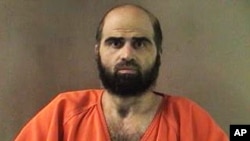HOUSTON —
The judge in the trial of a U.S. Army major accused of killing 13 people has ruled that an emotional recording of a dying victim can be used as evidence. The judge also set the date for Colonel Nidal Hasan's formal plea for Tuesday, July 2. Legal experts, however, say Hasan could still cause another delay in the proceedings.
Colonel Tara Osborn ruled Thursday that military prosecutors can use a recording from the cell phone of Private Francheska Velez after she was shot. She was pregnant at the time and cried out, "My baby, my baby!" Velez died soon afterward.
Such dramatic material is often ruled inadmissible in trials, but military law expert Geoffrey Corn at South Texas College of Law in Houston says statements from dying victims are an exception.
"It will have an emotional impact on the jury, but there is nothing unfair about that. That is the key; you only get to keep relevant evidence out when the prejudicial effect is unfair and there is nothing unfair in allowing the jury to hear the dying declaration of a murder victim," Corn said.
Military prosecutors say Velez was one of 13 people killed November 5, 2009, when Hasan fired on a gathering at Fort Hood, an army base in Texas.
The judge also cleared the way for jury selection to begin July 9. Osborn set a July 2 hearing for Hasan to make his formal plea.
Since this is a capital case, in which the death penalty could be imposed, military law prohibits him from pleading guilty to first-degree murder. Corn, however, says Hasan could cause another delay by trying to plead guilty to a lesser charge.
"He would do that to try to get some clemency value out of it. In other words, he could argue to the jury, 'Look, I am trying to accept responsibility without a deal, without any benefit, I am pleading guilty to non-capital murder. I would have pled guilty to the capital offense, but I am not allowed to,'" Corn said.
Corn says that if Hasan tries this tactic, it could complicate the case and even result in two sets of accusations being considered separately.
Victims' families have expressed frustration over the delays in starting the trial. Last year, there were several hearings over whether Hasan would be allowed to wear a beard, which he says is an expression of his Islamic faith.
The judge presiding over the case at that time ordered him to shave or be forcibly shaved to meet Army regulations. But that judge was eventually replaced and Judge Osborn has allowed Hasan to keep the beard. She also has allowed him to serve as his own lawyer, but kept appointed defense attorneys on hand so that they can step in if needed.
Colonel Tara Osborn ruled Thursday that military prosecutors can use a recording from the cell phone of Private Francheska Velez after she was shot. She was pregnant at the time and cried out, "My baby, my baby!" Velez died soon afterward.
Such dramatic material is often ruled inadmissible in trials, but military law expert Geoffrey Corn at South Texas College of Law in Houston says statements from dying victims are an exception.
"It will have an emotional impact on the jury, but there is nothing unfair about that. That is the key; you only get to keep relevant evidence out when the prejudicial effect is unfair and there is nothing unfair in allowing the jury to hear the dying declaration of a murder victim," Corn said.
Military prosecutors say Velez was one of 13 people killed November 5, 2009, when Hasan fired on a gathering at Fort Hood, an army base in Texas.
The judge also cleared the way for jury selection to begin July 9. Osborn set a July 2 hearing for Hasan to make his formal plea.
Since this is a capital case, in which the death penalty could be imposed, military law prohibits him from pleading guilty to first-degree murder. Corn, however, says Hasan could cause another delay by trying to plead guilty to a lesser charge.
"He would do that to try to get some clemency value out of it. In other words, he could argue to the jury, 'Look, I am trying to accept responsibility without a deal, without any benefit, I am pleading guilty to non-capital murder. I would have pled guilty to the capital offense, but I am not allowed to,'" Corn said.
Corn says that if Hasan tries this tactic, it could complicate the case and even result in two sets of accusations being considered separately.
Victims' families have expressed frustration over the delays in starting the trial. Last year, there were several hearings over whether Hasan would be allowed to wear a beard, which he says is an expression of his Islamic faith.
The judge presiding over the case at that time ordered him to shave or be forcibly shaved to meet Army regulations. But that judge was eventually replaced and Judge Osborn has allowed Hasan to keep the beard. She also has allowed him to serve as his own lawyer, but kept appointed defense attorneys on hand so that they can step in if needed.








